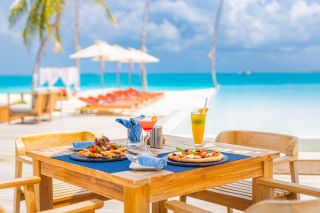Appetite
Vacation Eating 101
7 ways to manage eating while you're away from home.
Posted August 1, 2023 Reviewed by Tyler Woods

Vacation is usually a time away from the everyday grind, and with that comes eating in ways not consistent with how you eat at home. While your focus is probably on relaxing, making memories, and having a good time, managing health is not something you can really take a vacation from. It's not like your lactose intolerance, diabetes, or weight management goals disappear when you're away from home. As a therapist treating eating issues, I’m often asked how to eat while on vacation. You don’t have to ignore your health concerns or gain weight during your time away.
You might begin with the mindset that you probably won’t have the opportunity to eat whatever the local foods might be when you’re home, what's called "tourist eating." People who struggle with their weight might see their return home as a beginning and a time to start fresh with a resolve to lose and control the weight that they may have gained on vacation. Many people plan for damage control, thinking that dieting afterwards will do just that. But losing weight when you return from a trip is not easy. I would suggest instead preparing yourself before the trip so your return home does not have the stress of coping with the consequences of having ignored caring for your body. If anything, eating carefully on vacation could be a jump-start to an amazing you.
Conscious, mindful eating is about the only thing that really works to maintain a comfortable weight and control the potential for overeating. Remaining within the range of what should be your normal eating and not spiraling out of control can be quite difficult without planning. Here are some tips for managing your eating and weight pre- and post-vacation.
- Do an online search for everything you think you might be eating while away. You can find menus online to get an idea of the types of foods offered where you're planning to go. You can attempt to consciously plan what might be a reasonable meal. What you actually eat on the trip will be tempered by having an informed idea of what you're consuming. You can still eat amazing food and have fabulous meals without ignoring your health and continuing to respect your weight parameters. The key is being aware of what you eat and not eating mindlessly.
- Know what your food intake paraments are. Long before you plan to leave, figure out—or ask a healthcare professional such as a nutritionist—what your meal sizes or calorie intake should be for your age, height, and level of activity. Choose a reasonable weight in order to determine what your parameters should be. Having an idea of what you should be eating, and eating in a mindful manner goes a long way in beginning to establish limits and avoiding unnecessary consequences.
- As early as you can before you leave, begin keeping accurate track of everything you eat. Nobody likes doing this, but the act of actually looking up and writing down everything that goes into your mouth retrains your brain to become a conscious, rather than unconscious, eater and slows down the trajectory of compulsive eating.
- Plan to eat only things you love. Eating something that you merely “like” isn’t good enough for the body to register that you’ve eaten well and achieved satiation. As much as possible, eat foods you really love. This behavior should be maintained during, before, and after a trip.
- Become deliberate in planning and incorporating activities that you can easily do while away and begin doing them days before. These can be something as simple as taking a walk after dinner or planning to exercise more consistently. Training yourself prior to leaving for vacation puts you in a mindset of control before instead of after the fact. While away, you will probably be doing sightseeing and walking—that counts.
- Consciously plan to go back to your usual routine as soon as possible following the trip. Thinking that you’ve lost control so you just may as well keep overeating breeds continued loss of control. It doesn’t have to be that way. Knowing that you’ll get back on track in the next day or two is important in minimizing spiraling out of control. Be super conscious of that.
- Finally, use this time as an opportunity to recognize whether you might have or are developing disordered eating. If you realize that you’re consistently eating large quantities of food uncontrollably, can’t bring yourself to eat enough, are restricting what you’re eating, purging, or exercising in an obsessive way, you might want to check with a professional to evaluate your eating.
Time away from home can be restorative and memorable. Remember to honor your body's needs. It's never too early to plan to eat well.


